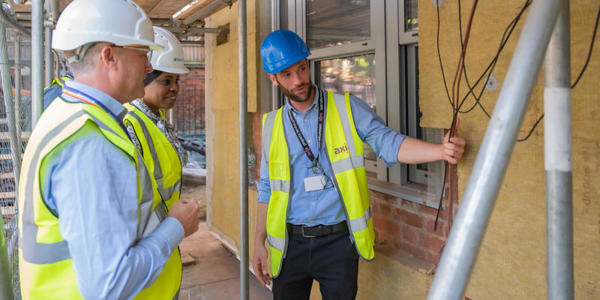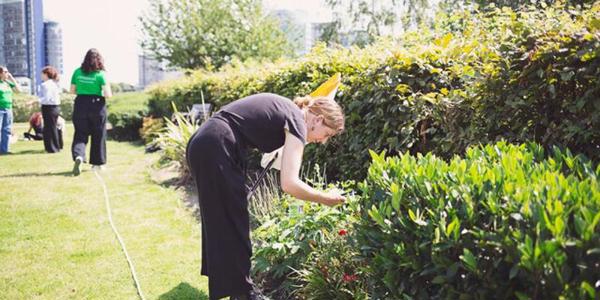To be truly sustainable, our work needs to be measurable.
That way, we can see where we need to improve and how we compare against industry standards.
In 2020 we helped create the Sustainability Reporting Standard for Social Housing. It contains 48 criteria across the areas of environmental, social and governance. Social housing providers can use these to not only track their own performance but also to show partners and investors that they’re meeting their targets.
In the year to the end of March 2023, we invested substantially for the benefit of residents. And our renewed local focus and increased investment in our homes and services are really starting to make a positive difference in our communities.
Environmental
We spent £356m maintaining and improving our homes and we plan to spend a further £2bn on our existing homes over the next five years. We also provided new social homes for over 600 families.
More than three quarters of our homes are now rated EPC C or above following improvements during the year. And we’re planning to upgrade thousands more homes in the next three years to reduce energy demand and help residents cut their bills. Of the 2,399 new homes we completed during the year, 93.46 percent are EPC B. By 2026 we want at least 82 percent of our homes to be EPC C or above and we continue to work towards all our homes achieving this by 2030.

Helping with home improvements
We’ve secured £27.3m from two waves of the Social Housing Decarbonisation Fund (SHDF) and grants from the Greater London Authority (GLA) to support our home improvement programme. We’re matching this with £25m of our own money to support a £50m project to improve the energy efficiency of thousands of our homes with an EPC rating of D or less to an average EPC C.
Biodiversity
We continue to carefully manage the 1,200 hectares of open space we own. This includes over 100,000 trees, five hectares of grazing marsh, canals, lakes, woodlands and 14 sites of nature conservation interest.
We recognise the importance of open spaces and are doing what we can to improve residents’ access to green space and regenerate local ecosystems. We want to improve the natural habitat where we build our homes and aim to achieve at least 10 percent biodiversity net gain in our new developments. We also spent £1.3m refurbishing existing play areas and are improving the open space on our existing estates where possible.

Working with Kew Gardens at Watermeadow Court
We’re partnering with Royal Botanic Gardens, Kew, to bring their expertise in pollination and nature-based solutions to our development at Watermeadow Court in Hammersmith and Fulham. As part of our joint venture with developers Mount Anvil, scientists from Kew are helping us ensure we have the most diverse habitat possible. In the future, young people will visit the site to learn about the importance of biodiversity and fighting climate change.
Social
We are a people organisation and we do what we can to look after our residents and local communities. Our rents are £621m lower than market levels at an average of £127 per week in London and the home counties. Last year we built 604 new social rent homes and almost 17,500 people benefit from our care and support services.
We invested in community activities, supporting nearly 450 people into work and 443 people into jobs and apprenticeships. We also helped 3,526 people with advice and support to improve their skills and 689 people to achieve qualifications. We awarded £1.1m in grants to support grassroot community organisations and helped 546 people save money on their energy bills through our energy advice service.
Resident voice
We’ve set up several formal processes to involve residents in decision making, including having six residents sitting on our Board and sub-committees and a further 18 on our strategic decision-making groups. We’ve also created a new Customer Engagement Co-design Action Group to help provide resident input into our decision-making process and provided financial support for 65 local resident groups.
We’re getting closer to our residents to ensure we’re delivering the things that matter most to them. And we’ve created five regions, run by managing directors who work with local neighbourhood teams on the ground in each area to make sure we really know what is going on. This means we can tailor the services and support we provide appropriately.

Getting closer to our residents
We’re improving resident communications with our new online portal, My Peabody. Residents can book and track repair requests, update their personal details, view statements, make payments and much more. More than 23,000 residents have registered so far and over 100 repairs and payment requests are being processed each day. We’re also introducing a ‘request a service’ option so residents can access property information or report issues such as fly-tipping in communal areas.
We’ll continue to support our more vulnerable residents using our usual channels.
Governance
All our employees – more than 4,000 - are paid at least the Real Living Wage or London Living Wage which is the equivalent for London to reflect the higher costs of living in the capital. We support our colleagues’ physical and mental health in a variety of ways, with a clear focus on mental and financial wellbeing.
We’ve introduced a new Employee Assistance Programme (EAP), which offers face-to-face counselling and other support. And we have over 50 Wellbeing Champions who are trained in mental health first aid, as well as various colleague networks.
In line with our own social values, we’ve introduced a minimum weighting of 20 percent for social value in all procurement tenders above the UK Procurement Threshold. This means companies and organisations bidding for Peabody contracts must give social value serious consideration when compiling tenders. It also ensures that we do business with companies who share our values and want to help grow our positive impact. To find out more see our report, Social value through supply chains: Impact Report 2022/23
Want to learn more about us?
Visit our Investors page for our latest news, reports, financial statements and more.
